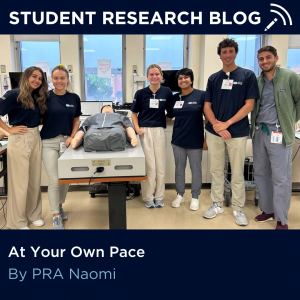By Naomi Benningfield, Peer Research Ambassador
 “Do you know you have thirty minutes? Thirty, thirty, yes…”
“Do you know you have thirty minutes? Thirty, thirty, yes…”
At some point or another, we have all experienced the burning torment of falling behind in a never-ending race. What were we doing in 3rd grade when we should have been saving up for a house? Or last semester, when we should’ve completed our second research thesis? What about the freshman next door who has already lined up a research internship with Yale and is studying to take the MCAT?
As you carry on through your academic endeavors, you will continually come across people who appear unbreakable and completely have their s*** together! It will feel easy and even natural to compare yourself to them, especially when we live in a world in which success is often publicly displayed. You may think, “Maybe I’m not cut out to go to medical school. I haven’t heard back from any of the professors I emailed. I’m not smart enough to do research, it isn’t for me.” These feelings of self-doubt will eat away at your subconscious as you let the pressure of trying to be “good enough” consume you.
In the past, I have fallen victim to and will admit that I still feel a sense of imposter syndrome. After completing my Associate’s degree in Education, I began to pursue my major in Molecular Cell Biology and my lack of self-confidence only seemed to skyrocket. With a completely different major, I had to start fresh which made me aware of the age gap between me and many of my peers. I still recall the embarrassment I felt when I found out my biology TA (teacher assistant) was younger than me or the discomfort that gnawed at me while watching my high school classmates graduate with their bachelor’s while I still had two years ahead of me. All of the winter and summer courses that I took in order to catch up were not sufficient enough to make up for what I perceived as “lost time”. I thought that quickly completing my bachelor’s was the worst of my problems up until I became interested in the medical field. With a moment of silence for my sanity, I was shattered by the recommended volunteer, shadowing, clinical, and research hours that I needed. My peers seemed to have everything perfectly pieced together and many already had years of clinical hours from the various healthcare positions they held from CNAs (certified nursing assistants) to MAs (medical assistants). I questioned how I could work in a hospital without any previous experience and how I could obtain any experience in the first place. As the first in my family to pursue the healthcare field, I simply didn’t know where to
begin.
I needed to be sure that I wanted to pursue a healthcare career and while I sat back to consider my options, I realized that becoming involved in research was the key. I began looking for medically related research as an opportunity to explore my interest and develop a deeper understanding of what working in healthcare would entail. I didn’t know much about anesthesia at the time but had been doing some readings online and wanted to learn more. In the summer of my junior year, I applied for a research internship at Hartford Hospital within their Anesthesia department. I became passionate about the work that I had been involved in and found myself being one of the last students to leave at the end of the day. Through the internship, my confidence became solidified as I knew what I wanted to do and came to accept the time it would take to get there.
Being a part of the research team had many benefits, including the opportunity to meet other undergraduate students and medical students who were able to give me valuable advice and pointers. I was also able to shadow physicians which gave me more of an insight into the day-to-day responsibilities of healthcare professionals. One of the most inspiring encounters I had was meeting an anesthesiologist whose experiences paralleled my own. He had served in the military as an airplane mechanic before deciding to change his career to pursue medicine. I was astonished to learn how he became a doctor later in life and he also told me about his daughter who had obtained a degree in education. He emphasized how important each of our experiences were and how they affect who we are and how we interact with others.
I came to realize that my background and experiences gave me leverage when connecting with patients and only enhanced my ability to openly communicate with them. My teaching degree
exposed me to what it was like to work with a diverse age range. It shaped me into a well-rounded individual and supported both my professional and personal growth. For those of you who are struggling to make up for “lost time” or may be drained from comparing yourself to those around you, I urge you to please stop undermining your own accomplishments. Take a moment to reflect on how far you have come.
Allow yourself to explore and change directions as you pursue your goals. Allow yourself to accept taking things slow or having to take a step back. Whether it’s a new career, a research project, or your day-to-day goals, there is no cookie-cutter pathway to get there. Every twist and turn merges to define who you are. So, as you are taking a growth year, changing your major, or delaying your graduation date, remember that everyone is on their own pathway so follow it at your own pace.
Naomi is a senior majoring in Molecular & Cell Biology with an Associates in Early Childhood Education. Click here to learn more about Naomi.